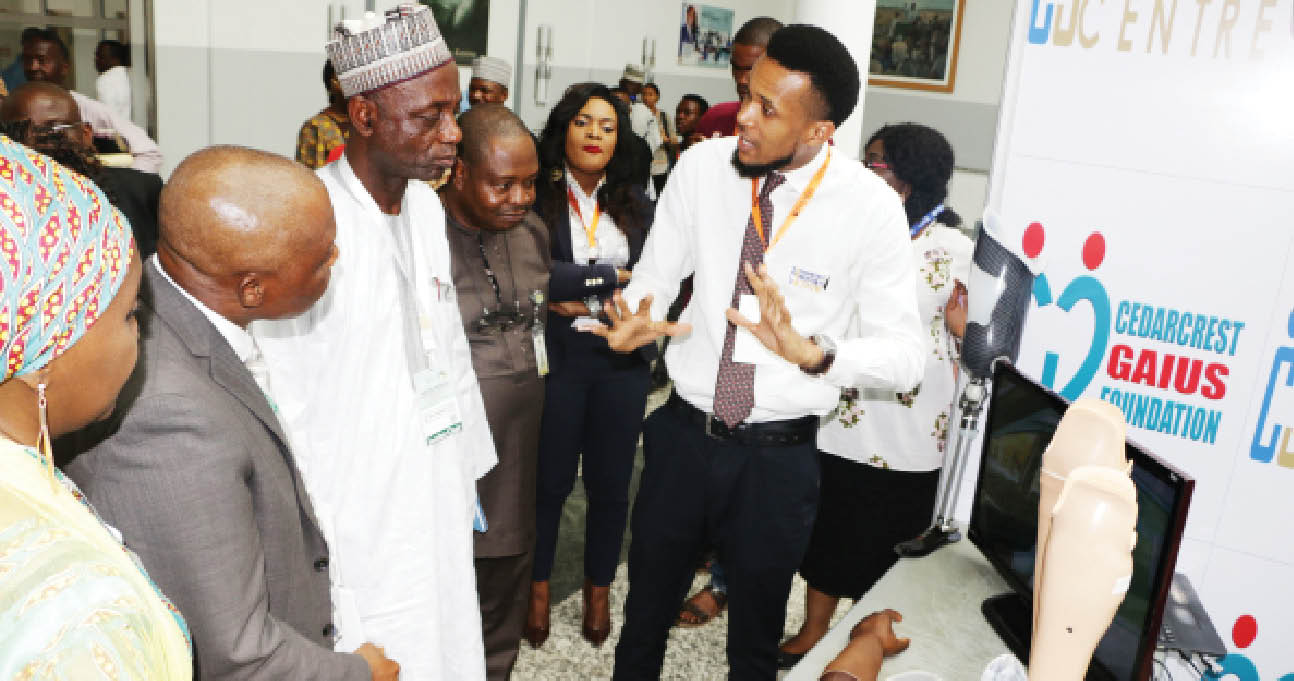‘Nigeria should invest more in human capital to tackle medical tourism, others’
A medical clinician and sonologist, Dr Joseph Williamson has advised the country to invest more in her healthcare system especially in the area of human capital development. He said doing so would help tackle medical tourism and other challenges bedeviling the country’s health system. Fielding questions from newsmen during the International Conference on Hospital Management and […]

Founder, Nisa Medical Group, Dr. Ibrahim Wada; Executive Director, Representative of the Minister of Helath Dr Joseph Amedu at the exhibition stand during the International Conference on Hospital Management and Administration (ICOHMA) in Abuja
A medical clinician and sonologist, Dr Joseph Williamson has advised the country to invest more in her healthcare system especially in the area of human capital development.
He said doing so would help tackle medical tourism and other challenges bedeviling the country’s health system.
Fielding questions from newsmen during the International Conference on Hospital Management and Administration (ICOHMA) organised by the Institute of Medical Sciences Africa (IMSA) yesterday in Abuja, he said there were international organisations willing to provide such trainings but that the country must reach out to them for assistance.
Speakers at the conference include: Dr. Joseph Williamson,and an active medical consultant for the Global Healthcare Accreditation Society (GHA)
Dr Joseph Williamson who has over 35 years’ experience as a medical clinician and sonologist, and also a keynote speaker during the conference said the country continues to lose its medical personnel to other countries as well as to medical tourism from the country because of inadequate investment.
He said: “In Africa and Nigeria basically we need to change a few things. The first one is how we invest in human capital, what are we doing to train the professionals in healthcare Number two, organsiations like the World Bank, Medical Technology Association and the American Institute of Medicine are willing to help with these trainings but we need to reach out to them and ask for this help.There a lot of trainings and help available.”
He said that Nigerians should also be made to feel important in accessing healthcare in their country adding that it would help stop what losses the country suffers from medical tourism.
He decried a situation where thousands of Nigerians travel to other countries for infertility treatments when the best and brightest infertility experts were right here in Nigeria.
“Why are they leaving to other countries? It is because we have not invested in our country. We have to establish infrastructures to maintain and house these patients right here in Nigeria,” he added.
National President Pharmaceutical Society of Nigeria (PSN)Pharmacist Mazi Sam Ohuabunwa during his presentation titled ‘Medication use and supply chain evaluation process for hospital’ said that the country needs to regularly review guiding documents such as Essential Medicine List (EML), standard treatment guidelines and the National Drug Policy to improve medicine supply chain system and enhance access to safe use of medicine.
He said others include the enactment of a separate piece of legislation that would guide the conduct of procurement, management and utilization of medicines in the health facilities in Nigeria and the institution of supplier monitoring system to ensure that all suppliers at all levels of care meet the requisite standards.
“The effectiveness of medicine supply chain management system depends largely on strict adherence to policies and procedures by key players in the supply chain. This calls for a robust system of monitoring and evaluation,” he said.
Dr Joshua Ofoli of the NisaHospital , Abuja, said challenges of healthcare Financing in Nigeria include inadequate political commitment to health, leading to poor funding of health in general, and primary healthcare in particular; poor administrative capabilities & inefficiencies of government ; poor revenue generating abilities.
He said other challenges include governance issues with the NHIS and poor buy-in by the states limiting coverage,Non-exploitation of other sources of health financing, poor regulation and risk for financial exploitation, limited incomes and rise in cost of healthcare.
He added that health financing involves mobilization of funds for health care and that health insurance was valuable tool to ensure optimal health outcomes.
